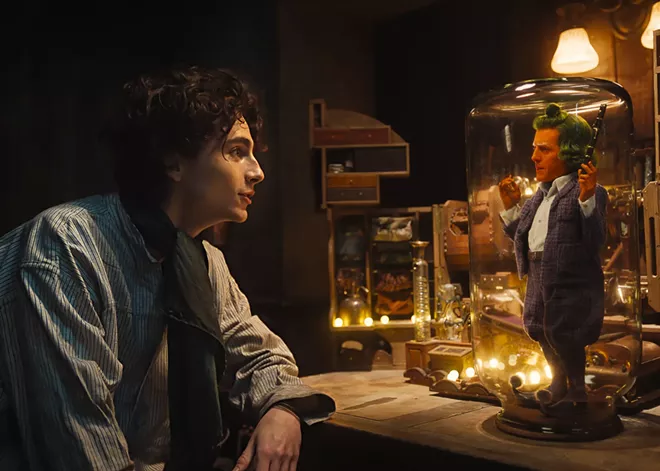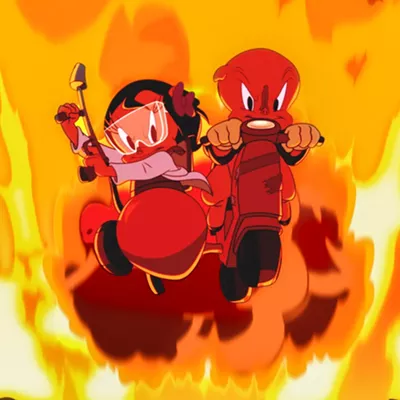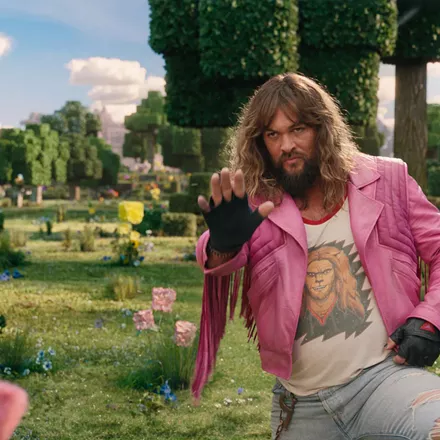There's nothing interesting about Willy Wonka's origin story. If anything, giving Willy Wonka an origin story ruins the character's central appeal, at least as presented in author Roald Dahl's 1964 novel Charlie and the Chocolate Factory and both of its film adaptations. Wonka is an off-putting weirdo whose sole purpose is as an agent of chaos to disrupt the drab life of young Charlie Bucket after he wins a tour of Wonka's fantastical candy factory. No one wanted to know what Wonka's childhood was like.
But that's never stopped Hollywood studios before, so Wonka gets his eponymous prequel anyway, in a movie that completely misjudges what could make him a worthwhile lead character. Director and co-writer Paul King's Wonka also misses nearly everything that makes Dahl's stories unique and alluring, settling instead for the upbeat, wholesome tone of King's beloved (but occasionally insipid) Paddington movies.
Like those movies, Wonka features a wide-eyed outsider arriving in the big city and getting into various shenanigans. Wonka (Timothée Chalamet) has spent the past several years at sea, working as the cook on a merchant ship and perfecting his esoteric chocolate recipes. He has big plans to open his own chocolate shop in the world-renowned Gallery Gourmet, but he's unprepared for the opposition he encounters almost immediately after disembarking.
First, he's bamboozled by unscrupulous laundress Mrs. Scrubbit (Olivia Colman), who tricks him into signing a contract that amounts to indefinite indentured servitude. It's baffling for a movie about a whimsical chocolatier to spend so much time on a storyline about escaping from forced labor, but King pays far more attention to Wonka's efforts to break free from Mrs. Scrubbit's clutches than he does to Wonka's candymaking enterprise.
Wonka faces challenges in that realm, too, in the form of a cadre of chocolate tycoons who hold a monopoly on the local market. His fanciful creations are so appealing to the public that they immediately threaten the livelihoods of those dastardly businessmen, who enlist the local police chief (Keegan-Michael Key) to get rid of Wonka. There are so many forces aligned against Wonka that he barely gets any screen time to do the chocolate-making he's most known for.
Wonka's main ally in thwarting Mrs. Scrubbit and getting his chocolate out to the world is a young orphan girl named Noodle (Calah Lane), who's a poor substitute for Charlie. Chalamet plays Wonka as a kind-hearted simpleton, a sort of chocolate savant who's naive about how the world works. It's a limp performance that lacks the charismatic weirdness of Gene Wilder in 1971's Willy Wonka and the Chocolate Factory, or even the more calculated oddity of Johnny Depp in Tim Burton's uneven 2005 remake.
Wonka is packed with wan, forgettable songs by Neil Hannon, and while Chalamet can carry a tune, he can't do much more with it. Instead of Dahl's bracing, nasty humor, Wonka relies on dull, obvious jokes, along with plenty of sentimentality. Wonka forms a surrogate family with Noodle and their fellow laundry workers, and the movie comes dangerously close to declaring that the real chocolate was the friends he made along the way. Even worse is a subplot about Wonka's illiteracy, which plays like the fake Oscar clip in Wayne's World where Mike Myers wails, "I never learned to read!"
Dahl would be appalled at that level of sappiness here, and King can't pull it off with the warmth he brings to the Paddington movies at their best. Wonka is cloying and phony, like the worst kind of off-brand chocolate you'd buy at a discount store. There's no value beneath its overly shiny wrapper.


























